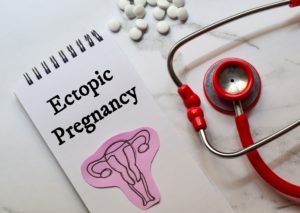
THE DANGERS OF MISSED ECTOPIC PREGNANCY
by Mary Smallwood, RN
Bleeding from an ectopic pregnancy (EP) causes 10% of all pregnancy-related deaths and is the leading cause of maternal death in the first trimester. It also carries a high risk of future health complications. Despite what is known about the risks, ectopic pregnancies are often misdiagnosed by healthcare providers.
What is an Ectopic Pregnancy?
An EP occurs when an embryo implants outside of the uterine cavity. The most common site of ectopic implantation is the fallopian tube. However, implantation can also occur in the cervix, ovaries, abdominal cavity, or within a prior cesarean section scar. In the general population, 1-2 out of every 100 pregnancies will be ectopic. The occurrence of EP rises to 2-5 out of every 100 for patients undergoing assisted reproduction. Other factors that increase the likelihood of having an EP include:
- Prior ectopic pregnancies;
- History of fallopian tube surgery or tubal ligation;
- Advanced maternal age;
- Smoking;
- History of pelvic infections; and
- Intrauterine device (IUD) use
Treatment of Ectopic Pregnancy
Ectopic pregnancies are not considered viable. There is no way for a fertilized egg to grow fully outside of the uterus. Currently, there is no technology available to move an ectopic embryo to the uterus.
The standard treatments for EP are either medicine or surgery:
- Methotrexate: an injection is used to stop the fertilized egg’s cells from growing. The body reabsorbs any cells that have already developed. The benefit of this treatment is that it should not damage the fallopian tube.
- Surgery: a surgeon makes a small cut, inserts a camera and removes the embryo. There is a risk that surgery may cause scarring or that a piece of the fallopian tube will need to be removed along with the embryo.
The Risks of Ectopic Pregnancy
The importance of timely identification and treatment cannot be overstated. There are significant risks of mortality and morbidity associated with EP that early detection may prevent. Between 6% to 16% of pregnant women who go to an emergency department in the first trimester for bleeding, pain, or both have an ectopic pregnancy. Some of the risks of missing this common diagnosis include:
- Hemorrhage;
- Infertility;
- Higher risk for future ectopic pregnancy;
- Need for surgery; and
- Emotional pain and suffering.
All patients with a suspected EP should be considered potentially hemodynamically unstable.
Standards for Preventing a Missed EP
Reports estimate that 40% of ectopic pregnancies go undiagnosed at first presentation. It is considered a challenging condition to identify, even among experienced gynecologists. A history and physical exam alone is unlikely to be sufficient to diagnose an EP. Other conditions with similar presentations include urinary tract infection, appendicitis, miscarriage, early pregnancy, pelvic infection, or ovarian cysts. Providers may not even consider EP as part of the differential diagnosis.
Some ways that healthcare providers can minimize the risk of missing an EP include:
- Female patients of childbearing age who have not undergone a hysterectomy should receive a pregnancy test, including patients with a tubal ligation or who say they could not be pregnant.
- Serum pregnancy tests are more accurate than urine tests, especially when the patient has been consuming a lot of fluids.
- The chart should document why an ectopic pregnancy is ruled out, with risk factors addressed.
- Any discrepancy between symptoms in the nursing notes and the physician’s notes should be reconciled.
- Perform serial exams for any patient with unexplained abdominal pain.
Sending a patient with a possible EP home from the hospital is not a definite deviation from the standard of care; however, it can be risky. A negative ultrasound that does not identify an intrauterine pregnancy does not rule out the possibility of an EP. Providers should ensure adequate followup as a way to minimize this risk. Ideally, patients with a pregnancy of an undetermined location should be seen by an obstetrician within 48 hours for a repeat exam, labs and ultrasound.
The provider should tell the patient if a workup can not definitively rule out an ectopic pregnancy. Besides being good practice, clear communication can be legally protective. If the patient later finds out she has an ectopic pregnancy, recalling that the provider discussed this, could make the patient less likely to followup with a malpractice claim.
For more information on ectopic pregnancies, see the resources provided on the sidebar.
Mary Smallwood, RN
Immediate Past President, Greater Orlando Chapter of AALNC
_________________________________________________________________________

MEET THE GREATER ORLANDO CHAPTER OF AALNC 2022 BOARD OF DIRECTORS
President: Jillian Talento, BSN, RN, CEN, LNCC
President Elect: Tory Palivoda, BS, RN, LNCC
Immediate Past President: Mary Smallwood, RN
Secretary: Lyn Brooks, BSN, RN, LNCC
Treasurer: Patty Mitchell, BSN, RN, CLNC
Director at Large: Robin Axtell, BSN, RN, LNCC
Director at Large: Kenyetta Christmas, MSN, RN, ACNP-BC, CLNC
Director at Large: Michelle Gaines, MNA, RN, CRNA
Director at Large: Judy A. Young, MSN, MHL, RN, LNCC
________________________________________________________________________
 ABOUT THE GREATER ORLANDO CHAPTER OF AALNC
ABOUT THE GREATER ORLANDO CHAPTER OF AALNC
The American Association of Legal Nurse Consultants (AALNC) was founded in 1989, as a not for profit membership organization dedicated to the professional enhancement and growth of registered nurses practicing in the specialty of legal nurse consulting. Chapter development quickly followed. The Orlando community was rich with nurses already practicing in the field of legal nursing. This group of committed professionals quickly became members of the new national organization and recognized the need for a local chapter. The Greater Orlando Chapter of AALNC, founded in 1990, was the second chapter formed under the new national organization. The Chapter was begun in support of AALNC’s mission, by providing networking opportunities, mentoring and support to nurses through professional development and education – a mission that is continued to this day.
___________________________________________________________
CONNECT WITH THE GREATER ORLANDO CHAPTER
|

Resources for Ectopic Pregnancy:
1. Baker, M., dela Cruz, J, StatPearls, May 1, 2022,
https://www.ncbi.nlm.nih.gov/books/NBK482192/
2. Lawani, Anozie, Ezeonu, International Journal of Women’s Health, 2013; 5: 515-521, https://www.ncbi.nlm.nih.gov/pmc/articles/PMC3751381/
3. Hendricks, E., Ectopic Pregnancy: diagnosis and Management, American Family Physician, 2020; 101(10):599-606, https://www.aafp.org/pubs/afp/issues/2020/0515/p599.html

Are you feeling a little lonely these days? Need other LNCs to chat, visit and network with? Don’t have an AALNC Chapter near you?
WE ARE NEAR YOU! Maybe not geographically, but through your computer or phone. The Greater Orlando Chapter has members from 27 States! SINCE 2014, The Greater Orlando Chapter’s live Chapter Meetings with CE Programs have been broadcast virtually! So members and guests have been attending from all over the Country since then! Because of COVID, since 2020 all of our CE Programs have been virtual only. If we start meeting in person again, you can still attend from anywhere as we will continue to broadcast all of our meetings and CE Programs as Webinars!
Regarding Greater Orlando Chapter Membership Cycle: Our membership year goes from May to May of each year, with membership renewal being May 31. With this cycle, members who joined in 2022, will renew their membership NLT May 31, 2023. Contact us if you have questions!
CONTACT US NOW:
Email us at: info@orlandoaalnc.org
Or visit us at: https://orlandoaalnc.org
 Be sure to check out our new publication, “SAVE THE DATES.”
Be sure to check out our new publication, “SAVE THE DATES.”
This new publication includes LNC education programs offered by AALNC, and ALL of the AALNC Chapters! We are so excited for this joint Chapter activity! Watch for the next edition, coming to your inbox by the end of December.
The Greater Orlando Chapter is currently working on the 2023 CE Program schedule, so mark your calendars now for these dates:
January 24, 2023: Virtual Annual Meeting and Officer Inauguration
February 21, 2023 Chapter Update and CE Webinar
March 21, 2023 Chapter Update and CE Webinar
April 27-29, 2023 AALNC Forum 2023, Louisville, KY
May 16, 2023 Chapter Update and CE Webinar
August 15, 2023 Chapter Update and CE Webinar
September 19, 2023 Chapter Update and CE Webinar
October 10 and 11, 2023 Chapter Update and CE Webinar Workshop
November 7, 2023 Chapter Update and CE Webinar
The Greater Orlando Chapter of AALNC is an approved provider of Nursing CE through the Florida Board of Nursing and CE Broker, and approved by the following States: Arkansas, District of Columbia, Florida, Georgia, Mississippi, New Mexico, South Carolina and West Virginia. We report CE directly to CE Broker in these states. For attendees from other States, we provide required documents for self-reporting CE to State Boards of Nursing.

In 2021 we started a new program, “LNC Success – Q&A with Greater Orlando Chapter Officers and Mentors.” We limit the event to 10 participants, so we can mentor each attendee – whether new to the LNC practice or experienced and ready for a change – we are there for you! The 2023 dates are loaded on our website and include:
- March 14, 2023. Registration will open on March 1, 2023
- May 9, 2023
- July 11, 2023
- September 12, 2023
- November 28, 2023
